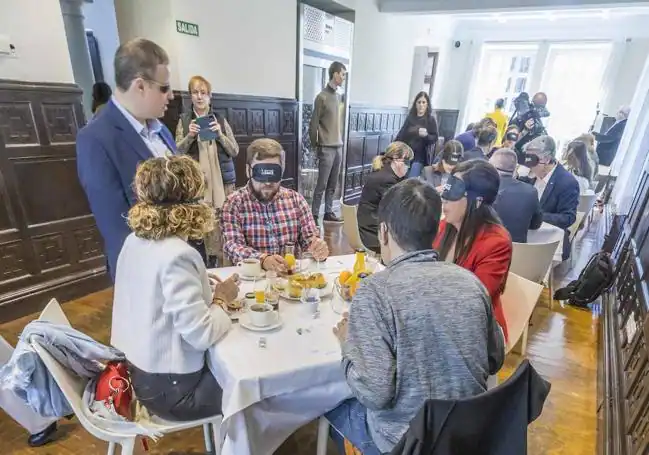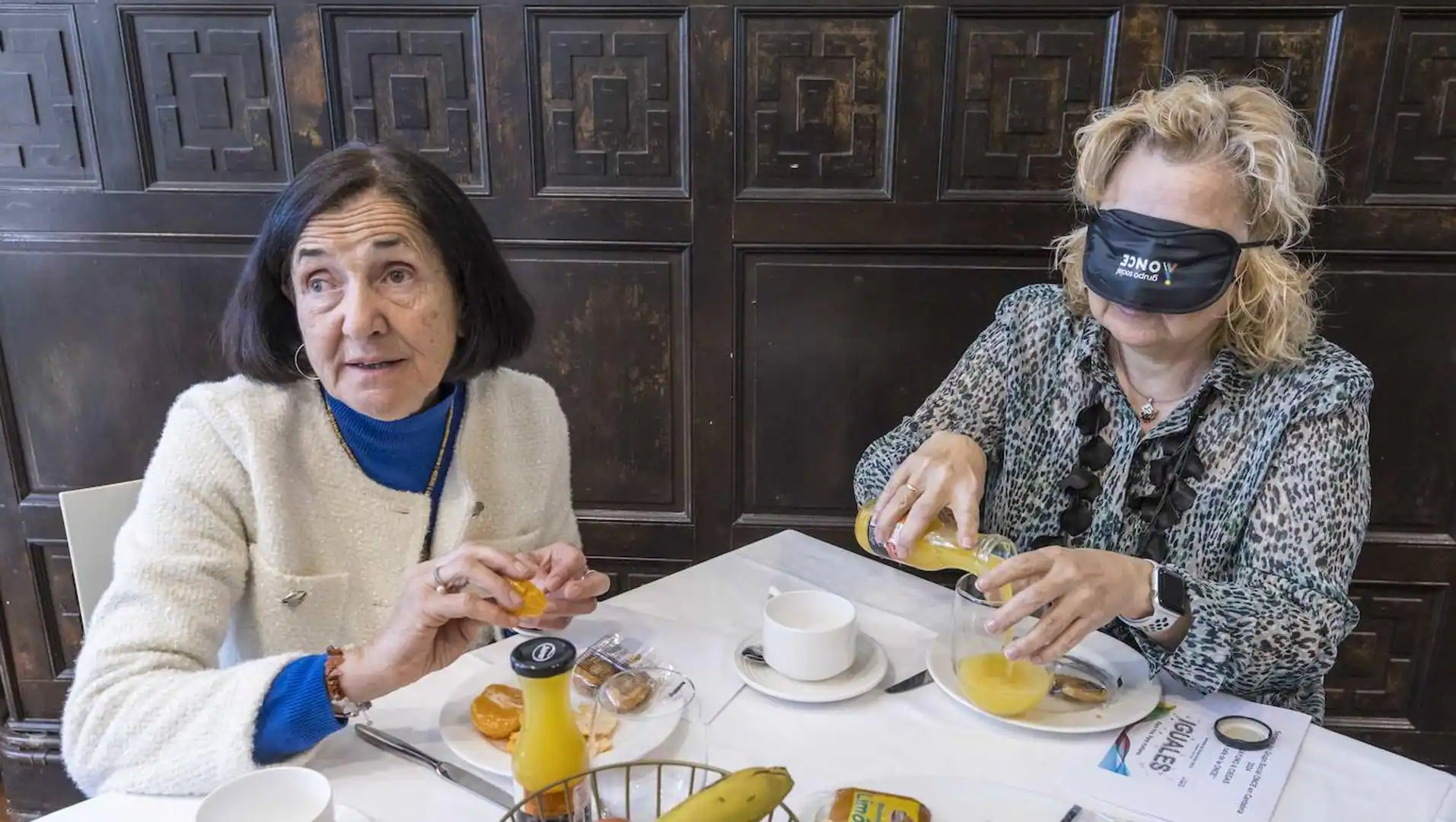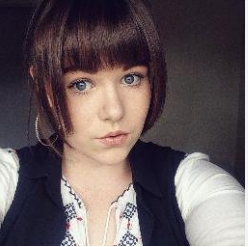
Putting yourself in the shoes of blind people was the objective of this activity held in Las Carolinas.
Roberto Ruiz

The trend of eating or dining blindly in a restaurant can become a culinary and multi-sensory experience. No doubt. And an exercise in empathy, too.
Putting yourself in the shoes of people who are blind or have severe visual disabilities, even for just a few minutes, makes you see further. I assure you. And what promises to be a unique experience, full of sensations, will be transformed into personal and cooperative learning, an inclusive experience to understand the daily life of a group of people who in many cases have had to learn to live and manage themselves. dark
For blind people, the mere fact of leaving home to go to a cafeteria, the supermarket, the pharmacy, to eat, to have dinner at a restaurant or, as in this case, to go to Las Carolinas for breakfast, requires going accompanied by a cane. Or Janis and Zodiac, two of the 24 guide dogs that carry out such important work in Cantabria (there are close to a thousand in all of Spain).
They are the eyes of Alice and Jesus. Two farmer shepherds who give them mobility and security every day to face daily barriers: «They give us the freedom that the cane does not give us. Being able to relax and change plans on the fly, like anyone else. It's a fantastic feeling! “We go everywhere with them.”
Precisely to make visible the work of these guides who carry out crucial work, representatives from various sectors of Cantabrian society put themselves in their shoes and in that of all people with visual disabilities during a blind breakfast organized by ONCE, this Wednesday in Las Carolinas, framed in the events of the Social Group Week in Cantabria.
For just over an hour, the twenty people who participated in this experience – organized for the second year – were spread across different tables to challenge the senses, share conversation and exchange sensations.
Alicia Martín (Madrid, 1959) has been living in Cantabria all her life. First in Santander and then in Laredo, where she worked as a coupon seller. Retinopathy caused her to progressively lose her vision at the age of 18. Her life changed but she adapted, “almost without realizing it.”
The first thing a blind person does when he arrives in an unknown place is knock, he commented. «People think that when we arrive at a place, we throw and break everything. We can do it, yes, but like anyone else. “We are very careful.”
It is through their hands that people like Alicia and Jesús observe the environment, “where the elements of the table, the cutlery, the plates, the glasses are located…”. So to speak, they read the table. «With the fork I see how the food is arranged on the plate and the size of the food, so as not to put something too big in my mouth. The human brain is prodigious. It adapts to what you are missing, but in a different way. “We sharpen other senses that provide us with information.”
Like any good pejina, Alicia declares herself a fan of potatoes with cuttlefish. She resists her fried foods because it is the most complicated thing for them, “especially turning them, so my husband takes care of it.” Cooking is one of the things she enjoys the most and in the kitchen of her house she relaxes, mainly if she makes roasts. «When I open the oven I am guided more by the sizzling and the smell than by the time. “Sometimes I make mistakes, of course, and I get angry with myself, but you end up accepting it.”

Putting yourself in the shoes of blind people was the objective of this activity held in Las Carolinas.
Roberto Ruiz
Jesús Santos (Santander, 1967) is a resident of Muriedas and was another of the protagonists of this meeting. At the age of 19 he began to lose night vision as a result of a degenerative disease and approximately 10 years ago he became completely blind. He trained as a draftsman, a profession to which he was able to dedicate himself, “enjoying it very much.” In 1998 she joined ONCE and, like Alicia, she worked selling the coupon.
Jesús is deafblind and lives with a niece and her children, but he has also lived alone. “I have been very autonomous and making my own food every day has not been a problem.” He doesn't cook regularly now but then “I prepared a lot of vegetables and grilled fish, I also cooked pasta… Frying in a pan was more complicated and over time I have given more importance to textures. I like to eat with my hands, it's easier. I try to avoid the knife, the fork, fish with many bones… »
When he sits at the table, Jesus likes to enjoy calmly. “I eat everything and very slowly.” His father, who was a fisherman, educated his palate well. And often his taste memory takes him to his mother's stews: “It happens to me all the time.”
Mastering the environment is the most important thing for him. “In the kitchen I have always tried to have everything in the same place, the oil, the salt… But even we ourselves are surprised by the things we can do.”
Tools needed
In addition to guide dogs, people like Alicia and Jesús today have the help of new technologies. Thanks to smartphones they have a powerful, useful and necessary tool in their pocket, which can be seen through them. Applications that help them and “from time to time give us the odd surprise,” they say. “When, for example, we stand in front of a can, at home or in the supermarket, and we don't know exactly what it is, we use our cell phone to have the application read it… Instead of opening sardines we can open needles or squid.”
They also use geolocators like Lazarillo, even if they know the route. “It makes it easier for us if we want to locate a pharmacy, a hotel, a restaurant, a bar, a bank, a theater… It 'sings' to us the spaces, shops or establishments that we pass by if we are in unknown environments.” But in her case, says Alicia, it is the dog who “takes us to certain places, the usual ones like the bakery, butcher shop, supermarket, pharmacy…”. And she clarifies: «They are not taxis, our dogs are guides, the order must be given in the environment. “They are fantastic and learn very quickly.”
We just ask for normality
Spain is the sixth country in the world in training guide dogs – the second in Europe – and the waiting list is 4 to 5 years on average for those who apply for it for the first time. Its objective is to make life easier for these people who have every right – recognized by law – to enter a restaurant with them, get in a taxi, take a bus, access the supermarket… «We only ask for normality. If someone doesn't see well, wear glasses. If someone cannot walk, they go in a wheelchair… We need to bring a guide dog, with its documentation available to whoever asks us for it.
And it is important for society to know that when these people are inside or outside any establishment, they are not offered any food. «The harmed are us. If they get sick, the next day they will not be able to do their job, which is to guide us.
Activities like this launched by ONCE help to put ourselves in the shoes of others. To see clearly in order to help transform the future of those who navigate a world completely in the dark.

Russell age 28 years Studying in world cooking I have a degree in England
Studying in world cooking I have a degree in England